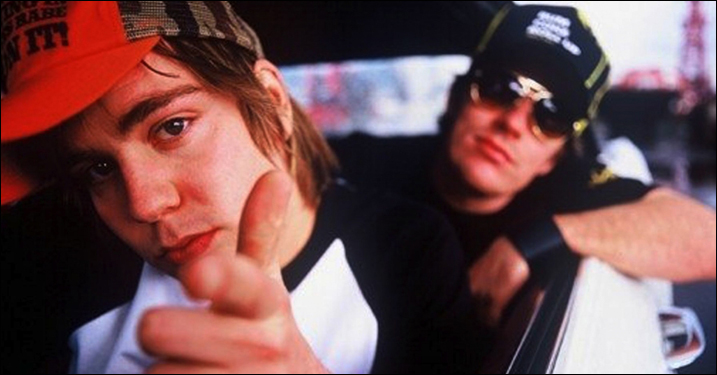“It’s great to be in America,” Gavin Bain said, bounding up onto the stage of the Stateside Theatre after the premiere of “The Great Hip Hop Hoax” at SXSW. “Everything’s bigger.”
Even if it was the Scot’s first time in the U.S., Bain already knew about how the country could blow things out of proportion. As a struggling rapper with a thick brogue, he and his partner Billy Boyd couldn’t get any record labels to answer their calls until they rechristened themselves Silibil & Brains, a Crazytown-esque duo from Southern California that nearly broke through to mainstream success in England until their fear of being found out got in the way.
The fact that Silibil & Brains only spent a limited amount of time in the spotlight after scoring a record deal with Sony UK before the truth about their background came out is something that prevents “The Great Hip Hop Hoax” from being quite as dramatic a cautionary tale its “great” title would suggest, but that’s almost besides the point in Jeanie Finlay’s rollicking adventure through the Wild West of the music industry of the early 2000s, an era when artists could begin to cultivate their image online and thrust themselves into the spotlight. Studded with intentionally crude animation and even cruder behavior captured of Silibil & Brains whose brilliance was less in the recording studio than as marketing pioneers who used online videos of drinking urine and carousing with bikini-clad women in hot tubs to boost their cred and build an audience, the film couldn’t be any more different than Finlay’s last film, the warmhearted portrait of a small English town’s last indie record store “Sound It Out,” except in its respect for its subjects and its estimable sense of place.
For “The Great Hip Hop Hoax,” that place isn’t rooted in physical geography, but virtual space where a group such as Silibil & Brains could find all the information they needed to look the part of a Huntington Beach-based band, complete with Volcom shirts and trucker hats. Convincing enough to chat up the Berkeley-bred members of Green Day at an awards show after party with no one giving it a single thought, the pair was as confident in their put-on personas as they were in their rhymes and while Finlay exhaustively interviews all the players for a comprehensive version of how the hoax was perpetrated, it’s the room she leaves for a consideration of the duo’s actual music that’s more impressive, instigating one of the more interesting debates about what is art to come down the pike since Banksy’s “Exit Through the Gift Shop.” If the music produced by Silibil & Brains has its fans, does it really matter if those fans don’t know their real backstory, particularly when so many artists are manufactured by the major labels anyway?
Finlay doesn’t make this comparison directly, instead preferring to investigate the personal politics that ultimately led to Silibil & Brains’ undoing, but it remains one of her most formidible skills to build the greater context around what ultimately is a fairly minor story. In spite of the lie that hovers over the duo’s short-lived career, it’s the usual tensions between Bain and Boyd that lead to their breakup as the fear of being found out, yet what separates “The Great Hip Hop Hoax” from a “Behind the Music”-like checklist of bad behavior and the disillusionment that comes with even the modicum of fame the two were able to achieve is how the film gradually reveals far different portraits of both men than one would suspect at the beginning – it’s not spoiling the film to describe either their breakup or how they pulled off their hoax, so much as what comes after, which is handled beautifully.
The quality of the participants certainly helps – in addition to Boyd and Bain separately, Finlay reels in Boyd’s wife Mary and Jonathan Shalit, the music producer who backed them, whose insights into their personal and professional lives, respectively, are invaluable to the film – but the structure, which goes down smoothly as a straightforward history, is equally impressive since it couldn’t have been easy to compile with the mountain of fabrications to sift through to establish a real foundation. Yet when “The Great Hip Hop Hoax” wraps up, it’s not the truth behind Silibil & Brains’ unusual rise and fall that seems so relevant as much as the lingering question at which point can a lie can become the truth, specifically in an industry where spectacle is a demand of the profession. When Shalit suggests near the end it was Silibil and Brain’s music that got them in the door rather than their novelty appeal as outsiders, it’s nearly as hard to take his words at face value as it is the rappers who claimed they were from California. To steal an American phrase, it’s go big or go home.
“The Great Hip Hop Hoax” does not yet have U.S. distribution. It will next play at HotDocs in Toronto on May 1st, May 3rd and May 4th.




